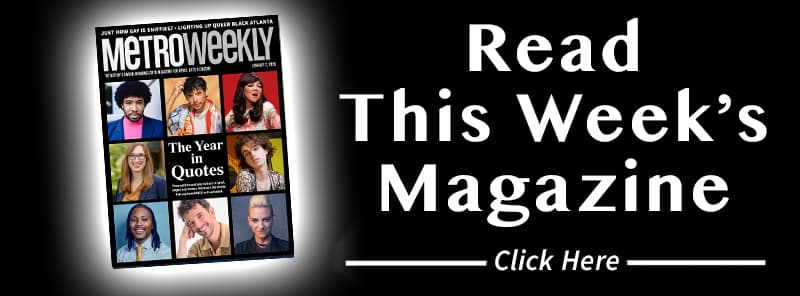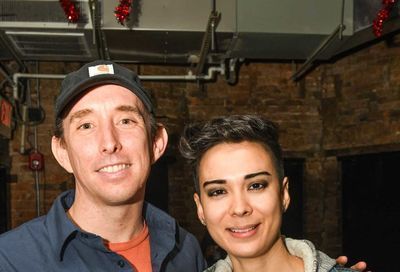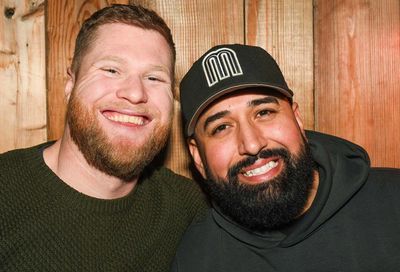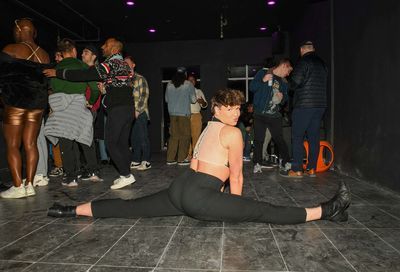‘Public Obscenities’ at Woolly Mammoth Review
Woolly Mammoth's "Public Obscenities" traverses cultural and generational gaps to explore the complexity of connection.

Delivered in near real-time and running close to three hours, Shayok Misha Chowdhury’s Public Obscenities, which he also directs, may have its flaws but it is nevertheless filled with beguiling charm.
Set in a modest modern-day home in India (evocatively rendered by scenic designer Peiyi Wong), the premise is certainly juicy: American-raised Choton has come to stay with his aunt and uncle while he films interviews for his American Ph.D. in gender studies.
In tow is photographer Raheem, Choton’s recently-acquired boyfriend, an American who doesn’t speak the language but who is eager to show respect for the family and culture.
Chowdhury enjoys gently plumbing the humor in his scenario — and even gives a few nods to Bollywood — but with an agenda that is far more searching and enduring. This was never going to be a sitcom.
A prime example is the way in which Chowdhury explores pacing and the sense of time in his narrative. Although he delivers moments of traditionally-paced theater with its stylized and contrived pauses and dialogue, there is an equally strong interest in suggesting the ponderous movement of time in real life. Silences are embraced, characters focus on their phones, there is space and presence to listen to the hum of the house fan in a darkened room.
These aren’t preludes to action as would be more traditional — they are the action. Chowdhury heightens this texture by seamlessly interspersing other media such as artfully-filmed interludes, restrained snippets of fabulous techno-ethnic music, and poignant projections from designer Johnny Moreno.
Still, as much as Chowdhury likes to explore the framework, he absolutely has a story — or two, or three — to tell. The immediate focus is on Choton, who finds returning to a country where he speaks the language but has never truly lived a trigger for much soul-searching. Abrar Haque, nervily charismatic, is wholly believable as this neurotic, self-doubting but also rather entitled man.
Yet as memorable as the character is, there is something not quite cooked in the characterization. There lingers the question of just how seriously Chowdhury takes him: is Choton asking heartfelt questions that will reforge his outlook or is he a self-indulgent Westerner who will never really listen to the answers?
There is also a disconnect between Choton and boyfriend Raheem, played by Jakeem Dante Powell with bemused poise. These two have an interestingly tentative dynamic until it turns fully on its head with an incongruous sex scene that is freighted with far too much expository and leaves way too many questions hanging over the scene.
Have these two really never been intimate before? Has Choton never been intimate with anyone? Right there, that’s a whole play in itself and, as treated here, the revelations get far too little air time.
It also begs belief that the uber-polite Raheem would choose the family dinner table as a suitable place for sex, let alone a first encounter. Sure, Chowdhury has his reasons for the public display and the embarrassment (or not) that it causes — not least, it riffs on the play’s title — but this feels like a forced moment that never quite gels with the realism that otherwise pervades the mood.

The other problem with Public Obscenities is that, despite its long running time, scant attention is given to the other stories, especially that of Choton’s aunt and uncle, Pishimoni and Pishe.
Chowdhury is artful in the way he suggests the state of their relationship and its history, but it too often floats around the edges as something comical, loaded, and unexplored. We long for a full pivot into this other, older relationship that has grown past Choton’s youthful preoccupations into a place where it is facing real questions of connection and bond.
Indeed, a filmed interlude of Pishe’s dream in which we glimpse something of this old, sometimes sad, sometimes mysteriously romantic relationship, is stunning. Just the filmed imagery alone of the older Pishimoni has so much to say about how blind we are to the beauty that endures regardless of age. Would that Chowdhury could write that play or film. His treatment of loss is similarly too much a glimpse; it is highly evocative, but primed for more.
What makes this couple sing are the phenomenal performances of Gargi Mukherjee as Pishimoni and Debashis Roy Chowdhury as Pishe. Mukherjee is wonderfully compelling as Choton’s aunt, bringing all the complexity (and comic timing) of this woman’s rather constrained, melancholy life. She brings her resilience but also her disappointments.
As Pishe, Debashis Roy Chowdhury offers the perfect tenor of affable, but determined self-preservation. If there is one issue here, it is with the use of the space: so much of the first scene at the dinner table is almost inaudible — it’s easy to miss much character-establishing information. This table needs to be front and center (at least to begin with).
In a challenging role that is mostly mimed, Golam Sarwar Harun gives his family factotum Jitesh a powerful but benign presence and he makes for a clever — and clearly expressed — connector between the generations. Another standout is Tashnuva Anan as Shou, one of Choton’s interviewees.
Anan brings forth a wealth of information on Shou’s life with convincing verve. As with the other people in this fascinating world, Shou’s experience begged for more than just Choton’s pontifications.
If Public Obscenities doesn’t always get the balance right, it is still an experience well worth its joys, mysteries, and contemplations.
Public Obscenities (★★★★☆) runs through Dec. 23, at Woolly Mammoth Theatre, 641 D St. NW, in Washington, D.C. Tickets are $25 to $85. Visit www.woollymammoth.net.
Support Metro Weekly’s Journalism
These are challenging times for news organizations. And yet it’s crucial we stay active and provide vital resources and information to both our local readers and the world. So won’t you please take a moment and consider supporting Metro Weekly with a membership? For as little as $5 a month, you can help ensure Metro Weekly magazine and MetroWeekly.com remain free, viable resources as we provide the best, most diverse, culturally-resonant LGBTQ coverage in both the D.C. region and around the world. Memberships come with exclusive perks and discounts, your own personal digital delivery of each week’s magazine (and an archive), access to our Member's Lounge when it launches this fall, and exclusive members-only items like Metro Weekly Membership Mugs and Tote Bags! Check out all our membership levels here and please join us today!
























You must be logged in to post a comment.